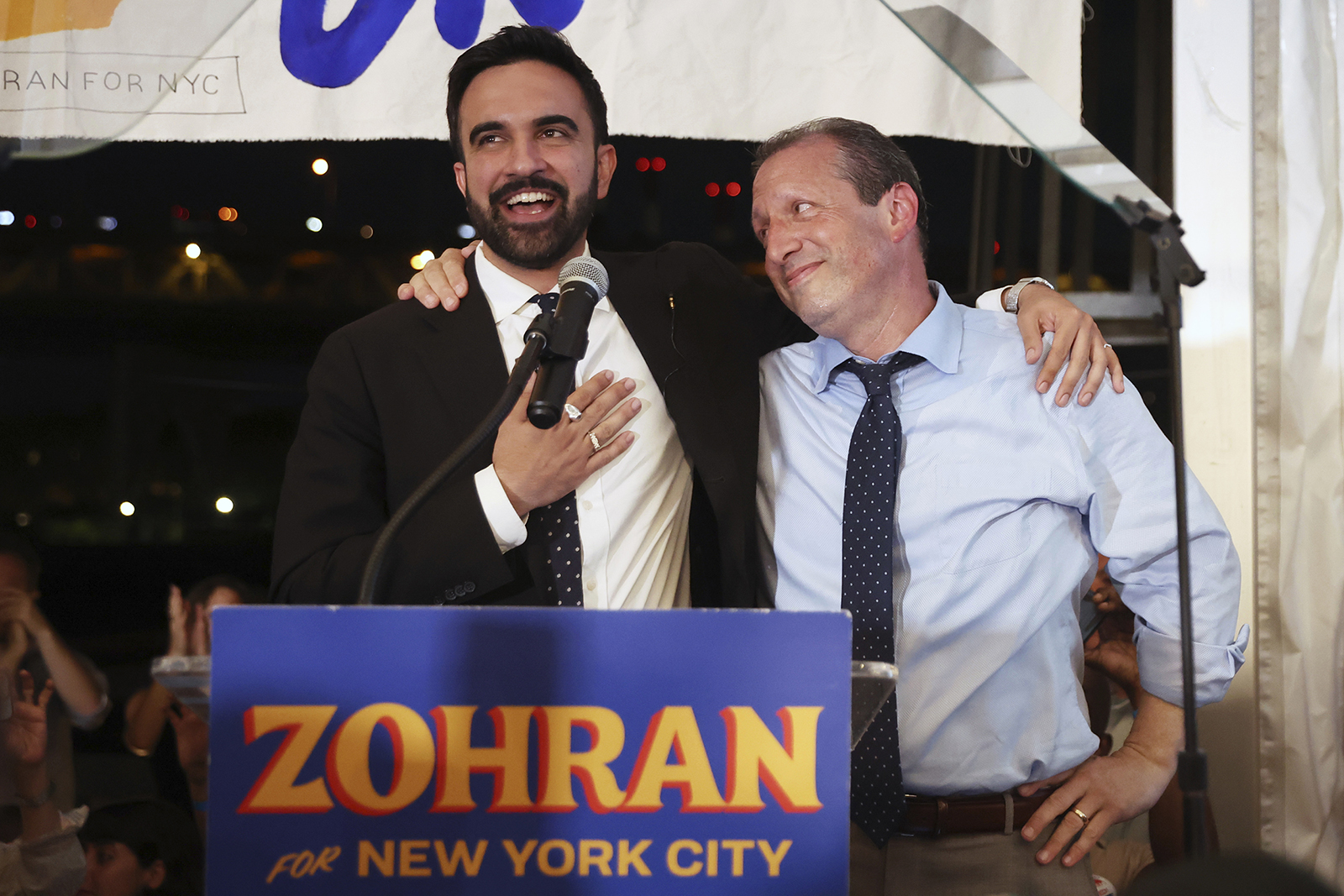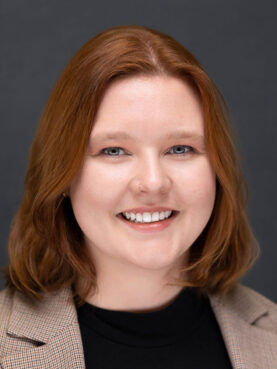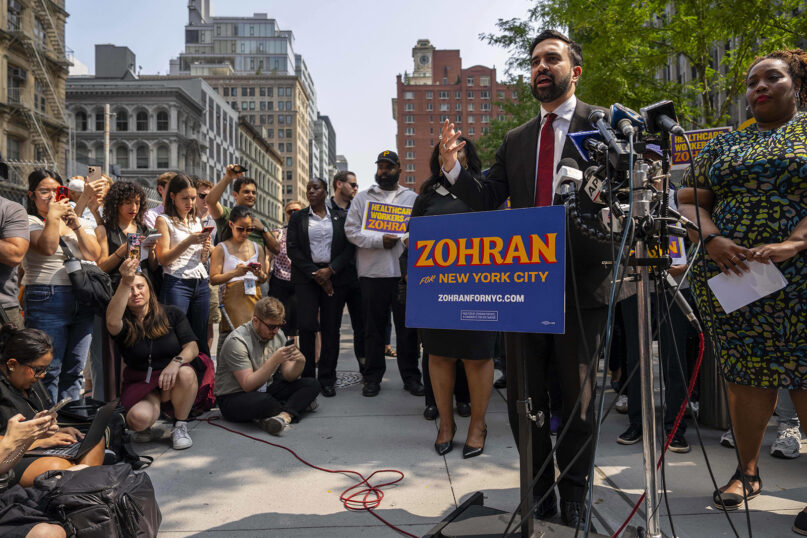
(RNS) — At the World Zionist Congress in Jerusalem this week, Rabbi Margo Hughes-Robinson was one of some 2,500 Jewish activists, organization leaders and government officials from around the world who gathered to decide how to spend more than $1 billion in annual funding for Zionist institutions around the world.
But Hughes-Robinson plans to be back home in New York in time to cast her vote for mayoral candidate Zohran Mamdani, a Muslim who does not believe Israel should exist as a state that privileges Jewish rights above all others.
“I’ve been active in city politics for quite a while, and I’m not afraid of being in coalition with people with whom I disagree on foreign policy points,” said Hughes-Robinson, an educator and translator of Jewish texts, in a phone interview. “Mamdani has talked quite a bit about his plan to reduce hate and violence in a city that’s seeing a spike in antisemitic violence and Islamophobia. I want a New York City that is safe for all of us. And I think Mamdani actually has a really good, effective plan.”
Hughes-Robinson will not be the only New York rabbi to cast her vote for Mamdani. Despite widespread opposition to his candidacy among many voters whose core concern is Israel, Jewish leaders are hardly monolithic in their views of Mamdani. More than a third, according to a recent poll, intend to vote for the 34-year-old Democratic socialist candidate.

Rabbi Margo Hughes-Robinson. (Courtesy photo)
Mamdani, who campaigned mostly on a promise to make the city more affordable, has been steadfast in his defense of Palestinian liberation, alarming many New York Jews. He has accused Israel of committing genocide against Palestinians in Gaza and has vowed to arrest Israeli Prime Minister Benjamin Netanyahu should he visit New York.
In recent days, some 1,150 rabbis and cantors from across the United States signed a letter opposing Mamdani and the “political normalization” of his anti-Zionism. It followed a Shabbat sermon by the prominent Rabbi Elliot Cosgrove of Park Avenue Synagogue, who said Mamdani “poses a danger to the security of the New York Jewish community.”
But Mamdani continues to show surprising strength among New York’s 1 million Jewish residents, especially with the anti-Zionist Jewish Voice for Peace and the progressive New York-based Jews for Racial and Economic Justice. The two organizations launched a joint campaign, “Jews for Zohran,” that has fielded thousands of volunteers to knock on doors and make phone calls on behalf of Mamdani.
“What we’re trying to make clear as ‘Jews for Zohran’ is that Jews thrive in a multiracial democracy where all voices are heard and celebrated and uplifted,” said Beth Miller, JVP Action’s political director.
Bend the Arc, Jewish Action, another progressive Jewish organization that does not take a position on Israel, also made support for Mamdani a central campaign.
RELATED: Tree of Life rabbi and Mother Emanuel pastor: 7 years of a friendship forged in tragedy
Among progressive Zionists, the most prominent rabbi to support Mamdani is Rabbi Sharon Kleinbaum, co-founder of the nonprofit New York Jewish Agenda and the rabbi emerita of Congregation Beit Simchat Torah in Manhattan. The 66-year-old rabbi appeared at a rally for Mamdani on Sunday (Oct. 26) in Queens’ Forest Hills Stadium, where she said she believed in his vision of a shared future for all New Yorkers — a city, she said, “where Jews and Muslims respect and care for each other.”
Other rabbis are joining in. A new letter, titled “Jews for a Shared Future” and drafted by mainstream rabbis, cantors and rabbinical students, already has hundreds of signatures. The letter does not endorse Mamdani but pushes back forcefully against the idea that Jewish safety will be compromised if he is elected.
“In response to Jewish concerns about the New York mayoral race, we recognize that candidate Zohran Mamdani’s support for Palestinian self-determination stems not from hate, but from his deep moral convictions,” the letter says. “Even though there are areas where we may disagree, we affirm that only genuine solidarity and relationship-building can create lasting security.”
View this post on Instagram
Mamdami has visited synagogues and met with Jews throughout his campaign, and especially in the past month, as Jews marked the High Holy Days. While he has focused on liberal synagogues such as Congregation Beth Elohim and Congregation Kolot Chayeinu, he has also met with several Hasidic Orthodox leaders, sitting down at their sukkahs, or huts, during the holiday of Sukkot and donning a black yarmulke.
On the eve of Yom Kippur, Mamdani attended Lab/Shul, a liberal nondenominational synagogue in Manhattan, where he received a standing ovation. Rabbi Amichai Lau-Lavie made it clear there would not be an endorsement, but the event nevertheless caused a backlash with some members furious that he was invited to speak.
“I understand and I respect the hurt of people I love who feel that he’s a legitimate threat to Jewish well-being and safety and the future,” Lau-Lavie said. “My question is: Are we approaching decisions from fear? Is it trauma that’s going to motivate how I go about the world, or is it the attempt to lean into love and to trust more?”
Several rabbis said they were initially drawn to Brad Lander, the city comptroller who also ran on the Democratic ticket for mayor and is Jewish. When Lander and Mamdani cross-endorsed each other in the city’s ranked-choice voting system, many Jewish leaders saw it as a signal that they could trust Mamdani.
“When Brad and Zohran co-endorsed each other in the primary, I felt like any reservations that I may have had about Zohran were really addressed, because I trust Brad, and I trusted that Brad would not co-endorse somebody he felt he had any reason to be concerned about, vis-à-vis the Jewish community,” said Rabbi Emily Cohen, who recently appeared in a video spot of four “proud New York rabbis for Mamdani” sponsored by Jews for Racial and Economic Justice.

New York City Democratic mayoral candidate Zohran Mamdani speaks during a press conference outside the Jacob K. Javits federal building Aug. 7, 2025, in New York. (AP Photo/Yuki Iwamura)
These rabbis said they were also impressed with Mamdani’s ability to listen carefully to their concerns and to modulate and change his message in response. For example, in July, Mamdani reconsidered his use of the phrase “globalize the intifada” and said he would discourage others from doing so.
What most excites these rabbis about Mamdani is the new possibility of Muslim-Jewish cooperation in politics — especially after the two-year example of deadly conflict in Israel and Gaza.
Ellen Lippmann, the founding rabbi of Congregation Kolot Chayeinu, a nondenominational Brooklyn synagogue, said it was the promise that Mamdani brings that’s most inspiring to her. “A colleague of mine said, ‘He gives me hope.’ And I thought that was a great answer. It feels exciting. It feels hopeful.”
RELATED: For 2 years, these US Jews sought a ceasefire. Their movement is ‘just beginning.’
